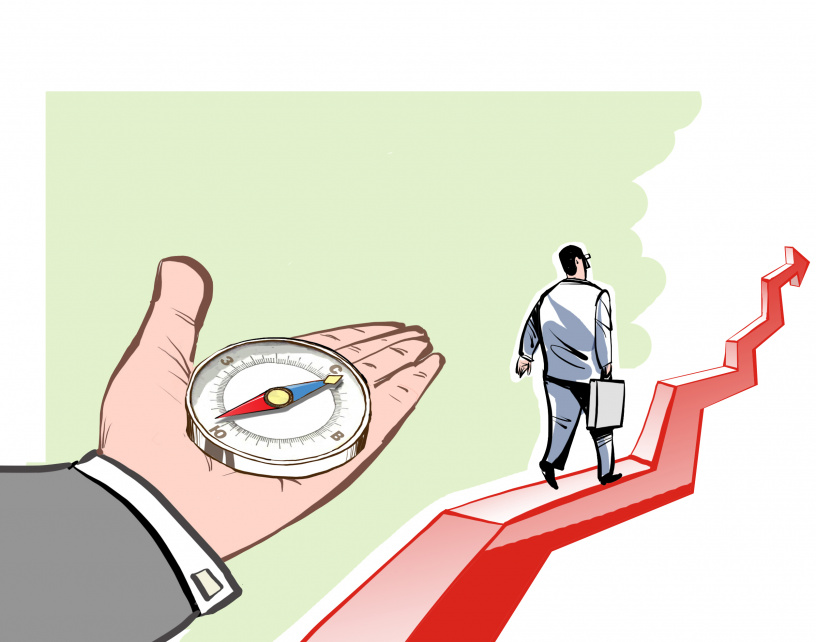
IEM professor now in charge of a group that will create a training tool for non-professional investors
How non-professional investors behave on the financial market, the dangers of falling for pyramid schemes, and ways of minimizing these risks. Marina Ryzhkova, professor at IEM, TSU, has won a Russian Science Foundation grant, which she will use to create special training software. The software will be tested on students, many of whom are non-professional investors.
Marina Ryzhkova, professor at the Department of Economics, IEM, became the head of the small group tasked with realizing the RSF grant. Their study “Behavior of non-professional retail investors on the financial market and the threat of digital pyramid schemes” will be conducted over the course of 2 years. The work will begin in January 2022.
“The application was written back in spring,” explains Marina Ryzhkova. “It’s time-consuming work – preparing to apply for a grant. It’s important to understand exactly what work needs to be done and who will be on the team. It’s best to be proactive in researching a topic. For us, that is exactly what happened. The behavior of non-professional investors on the market is a very relevant topic. Very recently, new rules were implemented for non-professional investors by regulatory bodies. But it’s not enough. We want to study the risks that non-professional investors face, in particular, the risk of falling for pyramid schemes. The issue could be discussed forever. With new technology, they just come up in new forms, but the issue remains the same.”
For the first year of work, the grant is 1.5 million rubles. The sum for the second year will depend on the results. One of the requirements is that no less than half of the group (and a small group is 2-4 people) must be comprised of young scientists (under the age of 35), who must be paid no less than 35% of the reward. According to the head of the group, this requirement was met. Moreover, for one of the young scientists, pyramid schemes are the primary academic interest. As a result, an interdisciplinary team was formed, consisting of researchers competent in various fields: theoretical economics, behavioral and experimental economics, applied social studies, online trading on the financial market, modeling and programming.
“Non-professional investors – and there are a lot of them, including students, for whom investment is just a way to make some extra money – face big risks today,” continues Marina Ryzhkova. “People often don’t understand how it all works and make mistakes. A great example is Alex Kearns. He misinterpreted the figures on his Robinhood account, which caused him to take his own life. He left a note saying “How was a 20-year-old with no income able to get assigned almost $1 million worth of leverage?” It was a tragic accident. But people indeed often do not understand what they are doing.”
The researchers’ task is to look into how pyramid schemes change with the advent of new financial instruments; what factors affect whether a person would get involved in a scheme or not; are they able to discern what it is and how the money is featured in this scheme.
One of the goals on the grant work plan is to create specialized simulation software. The scientists will teach non-professional investors, including students, how to use the platform, and later study how financial intermediaries and pyramid schemes can push people to irrational investments using various methods.
“The target audience of pyramid schemes are not students, of course,” continues Prof. Ryzhkova. “Students generally have little money to invest. Nevertheless, they are precisely those non-professional investors who suffer the most losses. Just go to a university campus and ask if there are any students who invest there – you will learn a lot of interesting things! They are generally boys, active and clever. They can manage their usually small funds, and sometimes even make a profit. Apart from this, they also do a lot of things – studying, working – and investment for them is just a way to get some extra money. Unfortunately, they do not always understand that financial instruments are becoming more and more complicated, and that non-professionals can become victims of fraud and get involved in pyramid schemes.”
The researchers emphasize that their goal is not to eradicate pyramid schemes – which is impossible – but to nurture behavior that will prevent non-professional investors from mass involvement in pyramid schemes.
Marina Ryzhkova, professor at the Department of Economics, IEM, became the head of the small group tasked with realizing the RSF grant. Their study “Behavior of non-professional retail investors on the financial market and the threat of digital pyramid schemes” will be conducted over the course of 2 years. The work will begin in January 2022.
“The application was written back in spring,” explains Marina Ryzhkova. “It’s time-consuming work – preparing to apply for a grant. It’s important to understand exactly what work needs to be done and who will be on the team. It’s best to be proactive in researching a topic. For us, that is exactly what happened. The behavior of non-professional investors on the market is a very relevant topic. Very recently, new rules were implemented for non-professional investors by regulatory bodies. But it’s not enough. We want to study the risks that non-professional investors face, in particular, the risk of falling for pyramid schemes. The issue could be discussed forever. With new technology, they just come up in new forms, but the issue remains the same.”
For the first year of work, the grant is 1.5 million rubles. The sum for the second year will depend on the results. One of the requirements is that no less than half of the group (and a small group is 2-4 people) must be comprised of young scientists (under the age of 35), who must be paid no less than 35% of the reward. According to the head of the group, this requirement was met. Moreover, for one of the young scientists, pyramid schemes are the primary academic interest. As a result, an interdisciplinary team was formed, consisting of researchers competent in various fields: theoretical economics, behavioral and experimental economics, applied social studies, online trading on the financial market, modeling and programming.
“Non-professional investors – and there are a lot of them, including students, for whom investment is just a way to make some extra money – face big risks today,” continues Marina Ryzhkova. “People often don’t understand how it all works and make mistakes. A great example is Alex Kearns. He misinterpreted the figures on his Robinhood account, which caused him to take his own life. He left a note saying “How was a 20-year-old with no income able to get assigned almost $1 million worth of leverage?” It was a tragic accident. But people indeed often do not understand what they are doing.”
The researchers’ task is to look into how pyramid schemes change with the advent of new financial instruments; what factors affect whether a person would get involved in a scheme or not; are they able to discern what it is and how the money is featured in this scheme.
One of the goals on the grant work plan is to create specialized simulation software. The scientists will teach non-professional investors, including students, how to use the platform, and later study how financial intermediaries and pyramid schemes can push people to irrational investments using various methods.
“The target audience of pyramid schemes are not students, of course,” continues Prof. Ryzhkova. “Students generally have little money to invest. Nevertheless, they are precisely those non-professional investors who suffer the most losses. Just go to a university campus and ask if there are any students who invest there – you will learn a lot of interesting things! They are generally boys, active and clever. They can manage their usually small funds, and sometimes even make a profit. Apart from this, they also do a lot of things – studying, working – and investment for them is just a way to get some extra money. Unfortunately, they do not always understand that financial instruments are becoming more and more complicated, and that non-professionals can become victims of fraud and get involved in pyramid schemes.”
The researchers emphasize that their goal is not to eradicate pyramid schemes – which is impossible – but to nurture behavior that will prevent non-professional investors from mass involvement in pyramid schemes.
